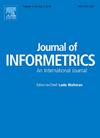修辞手段对引文行为的影响:科学论文中的说服及其对读者反应的影响
IF 3.5
2区 管理学
Q2 COMPUTER SCIENCE, INTERDISCIPLINARY APPLICATIONS
引用次数: 0
摘要
讲故事是传播科学的有效方法,修辞写作提供了一个结构化的框架来丰富叙述并增强其说服力。科学写作本身不会优先考虑晦涩难懂的语言;然而,过于枯燥和客观的科学文本可能难以理解和参与。本研究旨在探讨科技写作中的修辞风格对读者引用行为的影响。在亚里士多德修辞理论的基础上,我们构建了科学写作中三种关键修辞策略的计算度量:权威(气质),可读性(理性)和情感(感伤)。利用OpenAlex超过1000万篇期刊文章的数据集,我们分析了科学写作中修辞风格及其对引用行为的影响之间的因果关系。研究结果表明:(1)在科学写作中增加使用ethos和pathos对引文数量有积极影响,而logos对引文数量有消极影响;(2)作者声誉显著调节修辞的说服效果,尤其是减缓标志的负面影响;(3)修辞异质性受发表国、出版形式、学科和引文百分位数等因素的影响。这些结果为早期职业研究人员提供了有效科学写作的宝贵见解,并为出版商制定指导方针提供了参考。本文章由计算机程序翻译,如有差异,请以英文原文为准。
Impact of rhetorical devices on citation behavior: persuasion in scientific papers and its effect on reader response
Storytelling is an effective method for communicating science, with rhetorical writing offering a structured framework to enrich narratives and enhance their persuasive impact. Scientific writing does not inherently prioritize obscure or convoluted language; however, overly dry and impersonal scientific texts may be difficult to understand and engage with. This study investigates how rhetorical styles in scientific writing influence citation behaviors among readers. Building upon Aristotle's rhetorical theory, we construct computational measures for three key rhetorical strategies in scientific writing: authority (ethos), readability (logos), and emotions (pathos). Using a dataset of over 10 million journal articles from OpenAlex, we analyze the causal relationship between rhetorical styles in scientific writing and their impact on citation behaviors. Our findings reveal that (1) increased use of ethos and pathos in scientific writing positively influences citation counts, while logos has a negative causal effect; (2) author reputation significantly moderates the persuasive effects of rhetoric, particularly mitigating the negative impact of logos; and (3) rhetorical heterogeneity is influenced by factors such as country of publication, publishing formats, disciplines, and citation percentiles. These results offer valuable insights for early-career researchers on effective scientific writing and serve as a reference for publishers developing guidelines.
求助全文
通过发布文献求助,成功后即可免费获取论文全文。
去求助
来源期刊

Journal of Informetrics
Social Sciences-Library and Information Sciences
CiteScore
6.40
自引率
16.20%
发文量
95
期刊介绍:
Journal of Informetrics (JOI) publishes rigorous high-quality research on quantitative aspects of information science. The main focus of the journal is on topics in bibliometrics, scientometrics, webometrics, patentometrics, altmetrics and research evaluation. Contributions studying informetric problems using methods from other quantitative fields, such as mathematics, statistics, computer science, economics and econometrics, and network science, are especially encouraged. JOI publishes both theoretical and empirical work. In general, case studies, for instance a bibliometric analysis focusing on a specific research field or a specific country, are not considered suitable for publication in JOI, unless they contain innovative methodological elements.
 求助内容:
求助内容: 应助结果提醒方式:
应助结果提醒方式:


